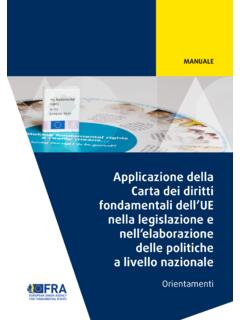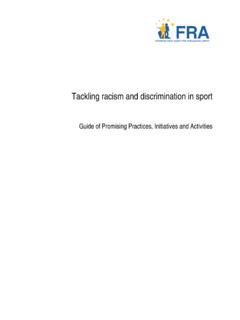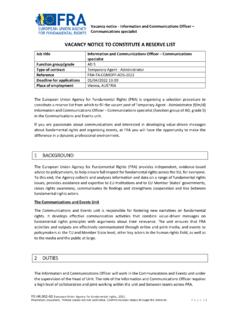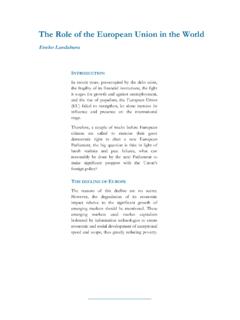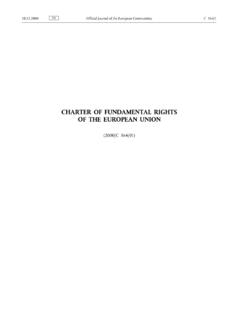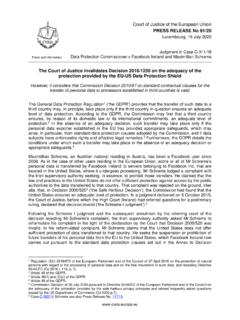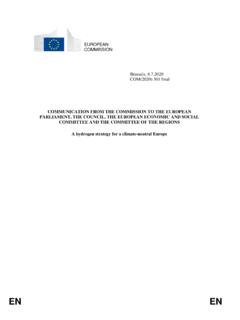Transcription of EU LGBT survey - European Union lesbian, gay, bisexual and ...
1 EU LGBT surveyEuropean Union lesbian, gay, bisexual and transgender surveyResults at a glanceEQUALITYC over image: Shutterstock / Max Lindenthaler More information on the European Union is available on the Internet ( ).FRA European Union Agency for Fundamental RightsSchwarzenbergplatz 11 1040 Vienna AustriaTel.: +43 158030-0 Fax: +43 158030-699 Email: data can be found at the end of this : Publications Offi ce of the European Union , 2013 ISBN 978-92-9239-173-7 European Union Agency for Fundamental Rights, 2013 Reproduction is authorised, except for commercial purposes, provided the source is in BelgiumPrinted on FSC paperEurope Direct is a service to help you fi nd answersto your questions about the European UnionNew freephone number (*):00 800 6 7 8 9 10 11(*) Certain mobile telephone operators do not allow access to 00800 numbers or these calls may be certain cases, these calls may be chargeable from telephone boxes or report addresses matters related to human dignity (Article 1), a right to life (Article 2), a right to education (Article 14), equality before the law (Article 20), the principle of non-discrimination (Article 21), health care (Article 35) and a right to an effective remedy and to a fair trial (Article 47)
2 Falling under the Titles I Dignity , II Freedoms , III Equality , IV Solidarity and VI Justice of the Charter of Fundamental Rights of the European LGBT surveyEuropean Union lesbian, gay, bisexual and transgender surveyResults at a glance3In the past decade, a growing number of international and national developments have addressed the fundamental rights of lesbian, gay, bisexual and transgender (LGBT) persons. Standards on non-discrimination and equality for LGBT persons have been further developed or reinforced by the European Union (EU), the Council of Europe and the United Nations (UN). Sexual orientation and gender identity have increasingly been recognised as grounds of discrimination in European and national legislation. Today, the situation of LGBT persons in the EU is no longer a marginalised issue but a recognised human rights concern. The European Union Agency for Fundamental Rights (FRA) has, since its creation, contributed to these developments by providing robust comparative analysis of the legal and social aspects of the fundamental rights situation of LGBT persons in the EU.
3 Although this analysis identifi ed the main obstacles, it also highlighted that the situation on the ground across the EU remained largely undocumented and that existing data were not comparable. European institutions also recognised the lack of robust, comparable data on the respect, protection and fulfi lment of the fundamental rights of LGBT persons. Following calls from the European Parliament, the European Commission, in 2010, asked FRA to collect comparable survey data on hate crime and discrimination against LGBT persons in all EU Member States and Croatia. As a result of this request, FRA developed the European Union survey of discrimination and victimisation of lesbian, gay, bisexual and transgender persons , which was launched online on 2 April 2012 and ran until 15 July 2012. A very large number of respondents, 93,079, participated in the research, providing a wealth of comparable data.
4 In many respects, the results raise severe concerns: almost half (47 %) of all respondents said that they had felt personally discriminated against or harassed on the grounds of sexual orientation in the year preceding the survey . A majority of respondents who were attacked in the past year said that the attack or threat of violence happened partly or entirely because they were perceived to be LGBT (59 %). Respondents rarely, however, report discrimination or violence, mainly because they believe nothing would happen or change if they reported such incidents to the survey results provide valuable evidence of how LGBT persons in the EU have experienced discrimination, harassment and violence in different areas of life. By highlighting and analysing the survey results, this report, together with the accompanying EU LGBT survey European Union lesbian, gay bisexual and transgender survey : main results report, will contribute to much needed discussions in the EU and its Member States about concrete legislative and non-legislative measures to improve the situation for LGBT persons living in the EU.
5 Morten Kj rumDirectorForeword4 Country codesCountry codeCountryATAustriaBEBelgiumBGBulgariaC YCyprusCZCzech RepublicDEGermanyDKDenmarkEEEstoniaELGre eceESSpainFIFinlandFRFrance HUHungaryHRCroatiaIEIrelandITItalyLTLith uania LULuxembourgLVLatviaMTMaltaNLNetherlands PLPolandPTPortugalRORomaniaSESwedenSKSlo vakiaSISloveniaUKUnited Kingdom5 FOREWORD .. 3 WHY IS THIS survey NEEDED? .. 71 FRA OPINIONS AND KEY FINDINGS .. Strengthening EU action and national responses to combat discrimination on the grounds of sexual orientation and gender identity .. Ensuring equal treatment in employment .. Improving protection against discrimination beyond employment .. Recognising and protecting LGBT victims of hate crime .. Improving rights awareness and reporting on discrimination and violence .. 142 WHAT DO THE RESULTS SHOW? .. Discrimination on the grounds of sexual orientation.
6 Discrimination because of being LGBT in employment .. Discrimination because of being LGBT in areas of life outside employment .. Rights awareness and reporting discrimination .. Violence and harassment .. Daily life and the social environment .. 24 THE survey IN A NUTSHELL .. 27 BIBLIOGRAPHY .. 31 Contents7In 2012, almost half of all respondents to the EU survey on the perceptions and experiences of lesbian, gay, bisexual or transgender (LGBT) persons said that they had felt personally discriminated against or harassed on the grounds of sexual orientation in the year preceding the survey . Furthermore, a quarter of all EU LGBT survey respondents had been attacked or threatened with violence in the previous fi ve years. This fi gure rises to 35 % for transgender respondents. Rarely did respondents report discrimination or violence to the police or other authorities, mainly because they thought nothing would happen or change if they reported such type of fi nding provides policy makers with the robust, comparable data they need to develop effective laws and policies to fi ght discrimination, violence and harassment, thereby ensuring equal treatment across society.
7 FRA therefore designed and carried out the present online survey , which collected the responses from more than 93,000 LGBT persons across the EU and Croatia. The results of the large array of questions that were asked are presented and analysed in detail in the EU LGBT survey European Union lesbian, gay, bisexual and transgender survey Main results the basis of statistical evidence collected, FRA developed its policy-relevant advice to inform the development of legal and policy responses at EU and national levels. The aim is to ensure that the fundamental rights of LGBT people are effectively respected, protected and fulfi lled. The European Parliament expressed its support for such EU-wide action in several resolutions calling on the European Commission to develop an LGBT Roadmap. Moreover, a coalition of seven EU Member States namely Belgium, Finland, France, Latvia, the Netherlands, Sweden and the United Kingdom has launched an appeal to the European institutions that an ambitious European strategy should be set up in the area of fundamental rights of LGBT FRA (2013).
8 2 France, Prime Minister (2012), p. is this survey needed?Before this survey , and at the request of the European Parliament, in 2007, FRA collected data on discrimination against LGBT persons and the situation regarding homophobia in the EU. FRA published an analysis of the legal situation in a report in 2008, which was updated in A report analysing the social situation of LGBT persons in the EU followed in This report highlighted the lack of cross-national comparative data on the lived experience of LGBT persons in the key areas of discrimination, violence and can EU institutions and Member States work with the results of the survey ?This survey provides a wealth of robust, comparable data that can assist the EU institutions and Member States in identifying the fundamental rights challenges facing LGBT people living in the EU and Croatia. It can thereby support the development of effective and targeted legal and policy responses to address the needs of LGBT persons and ensure the protection of their fundamental rights.
9 The survey findings can also be used to assess whether measures taken to comply with existing standards bring about concrete with other large-scale surveys carried out by FRA, such as the European Union minorities and discrimination survey (EU-MIDIS),4 the Roma pilot survey5 or the violence against women survey ,6 repeating this survey would allow FRA to provide comparable evidence of progress made over time in fulfi lling fundamental rights. EU Member States are encouraged to use the data collected through this survey to assess the effectiveness of national policies and strategies aimed at improving the protection of fundamental rights for LGBT 6 73 See FRA (2008) and FRA (2010).4 See FRA (2009a).5 For more information on EU-MIDIS, see: ; and FRA (2009b).6 For more information on the Roma pilot survey , see: ; and FRA (2012a).7 Fore more information on the violence against women survey , see: CONCEPTS AND TERMINOLOGY8EU LGBT survey Results at a glanceThe target group of the EU LGBT survey is persons who self-identify as being gay, lesbian, bisexual or transgender.
10 The survey examines issues of equal treatment and discrimination on two grounds, namely sexual orientation and gender identity. The report uses the term LGBT as an umbrella term encompassing all survey respondents. As the analysis requires, it will also refer to the different subgroups, thereby acknowledging that the fundamental rights issues affecting lesbian, gay, bisexual and transgender persons may be profoundly different. It should also be noted that the experiences of LGBT persons are not only defi ned on the basis of their sexual orientation or gender identity, but are also affected by their educational or socio-economic background and other persons may have different levels of openness about being LGBT to family, friends or colleagues. Some are open about their LGBT identity whereas others cannot or do not want to share this with terms used are based on the Yogyakarta Principles on the application of international human rights law in relation to sexual orientation and gender International treaty bodies and other human rights mechanisms, including the Council of Europe s Commissioner for Human Rights, the UN Committee on Economic, Social and Cultural Rights and the UN High Commissioner for Human Rights, have used orientation refers to each person s capacity for profound emotional, affectional and sexual attraction to, and intimate and sexual relations with, individuals of a different gender or the same gender or more than one gender.


